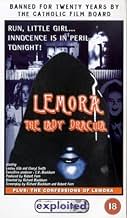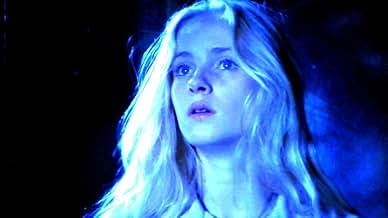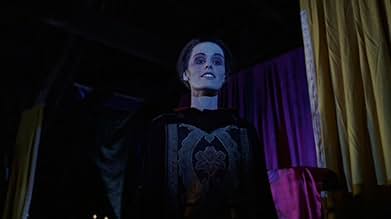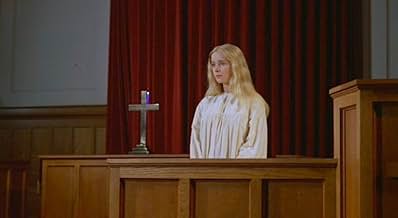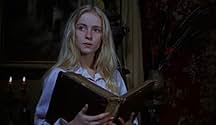Lemora - Kampf mit der Unterwelt
Originaltitel: Lemora: A Child's Tale of the Supernatural
IMDb-BEWERTUNG
6,1/10
2674
IHRE BEWERTUNG
Füge eine Handlung in deiner Sprache hinzuA young girl who returns to her hometown to see her dying father finds herself being drawn into a web of vampirism and witchcraft.A young girl who returns to her hometown to see her dying father finds herself being drawn into a web of vampirism and witchcraft.A young girl who returns to her hometown to see her dying father finds herself being drawn into a web of vampirism and witchcraft.
- Regie
- Drehbuch
- Hauptbesetzung
Empfohlene Bewertungen
This highlight of seventies horror cinema is a vibrant and lush Gothic fairytale story of a young girl's odyssey as she searches for her father in a world of vampires and demons that wont hesitate to take her innocence at any opportunity that they get. Richard Blackburn's film takes influence from a number of sources across both film and literature, but in spite of this; the writer-director has managed to mould together a tale that is both haunting and original. The story follows Lila Lee, the daughter of a notorious gangster who, after finding his wife in bed with another man, proceeds in blowing both her and her lover to bits. Shortly after her father had fled the town to avoid the law, Lila Lee receives a letter telling her that her father is on his deathbed and wants her to come and see him. Only thing is, this letter is signed 'Lemora'. The film plays out like an offbeat coming of age drama, with the innocent young Lila Lee learning that all is not as it seems, and that danger lurks around every corner. The supernatural elements serve brilliantly as a metaphor for the similar dangers in real life.
The acting in Lemora clearly isn't the most important aspect of the film, but there are still some notable performances on display. Cheryl Smith takes the lead role as the angelic Lila Lee, and completely looks the part as a bewildered young girl in the centre of a world she knows nothing about. The title role of 'Lemora' is taken by Lesley Gilb. This actress doesn't have a film credit to her name after this film, and it's not really surprising as despite looking the part; her performance is wooden in the extreme. Writer-director Richard Blackburn is surprisingly effective in his small role as a reverend. He completely convinces as the odd god fearing preacher. Really, though, it's the more aesthetic elements of the film that rule; and the atmosphere and the make-up are absolutely excellent. The nighttime filming helps to create a sense of danger at every turn, and brilliantly compliments the fear that the child at the centre of the story is feeling. The make-up is effectively done, but not overdone; which makes the monsters feel very real despite their otherwise otherworldly appearance. Lemora, despite it's low budget and inexperienced crew, is a surprisingly professionally done film. While most films released at this point in time relied on high body counts and gore levels to draw audiences; Richard Blackburn has put the focus on story and atmosphere, and that is why Lemora is the enduring, albeit lost, classic that it is today.
The acting in Lemora clearly isn't the most important aspect of the film, but there are still some notable performances on display. Cheryl Smith takes the lead role as the angelic Lila Lee, and completely looks the part as a bewildered young girl in the centre of a world she knows nothing about. The title role of 'Lemora' is taken by Lesley Gilb. This actress doesn't have a film credit to her name after this film, and it's not really surprising as despite looking the part; her performance is wooden in the extreme. Writer-director Richard Blackburn is surprisingly effective in his small role as a reverend. He completely convinces as the odd god fearing preacher. Really, though, it's the more aesthetic elements of the film that rule; and the atmosphere and the make-up are absolutely excellent. The nighttime filming helps to create a sense of danger at every turn, and brilliantly compliments the fear that the child at the centre of the story is feeling. The make-up is effectively done, but not overdone; which makes the monsters feel very real despite their otherwise otherworldly appearance. Lemora, despite it's low budget and inexperienced crew, is a surprisingly professionally done film. While most films released at this point in time relied on high body counts and gore levels to draw audiences; Richard Blackburn has put the focus on story and atmosphere, and that is why Lemora is the enduring, albeit lost, classic that it is today.
This is an unusual and enjoyable film that may have ambitions beyond it's means but is nevertheless a very brave attempt to do something just that little bit different. We begin with Cheryl Smith as the angelic, purer than pure, Lila Lee, star of the local church and living under the protection of her minister in the absence of her gangster father. Both here and later in the scenes with the magnificent lesbian vampire, Lemora, played by Lesley Taplin (Gilb) there are unmistakable hints that these older 'guardians' have more than the interests of the virgin child at heart. The opening scenes in the church and the later ones in Lemora's residence are colourful and rather grandly shot but it is the sequence depicting the young girl's seeming trip to find her father that is most astounding. From the moment she leaves the protection of the minister, she seems not only most vulnerable but the sets seem flimsy and almost laughable, but I'm guessing that this was deliberate and that even the bumpy creaky bus with the unbelievable driver are all designed to let us know that maybe not all is how it seems here. After this great sequence we meet the impressive Lemora and various zombies but despite a rather creepy bath scene there is just a little too much, running about. Still, unusual and well worth seeing.
Never had heard of this one before, and I assumed it would just be a low-budget snoozer - but it's not! It's pretty damn good! Angelic girl leaves her church to find her murderous dad so she can forgive him and finds herself involved with vampires instead. Very well shot and quite creepy. This deserves more attention. Plenty of tension; it feels like there's something supernatural and terrifying around every corner. Cheryl Smith made her debut here - she would later adopt the professional nickname Rainbeaux and briefly play with the Runaways band.
Looking at the packaging to this lost classic, I was expecting a real crummy slice of early 70's schlock, hence why I took so long to actually put the tape into the VCR, so it was a total surprise when it turned out to be a genuinely very haunting, beautifully made creepfest.
The plot's fairly simple, for anyone who hasn't seen it, involving as it does a pure-as-the-driven snow church girl, Lila Lee, (of an unspecified age but I'm guessing around 13/14?) who receives a letter from the mysterious "Lemora" asking her to come out to some remote town in the middle of nowhere to see her long-lost gangster Father as he lies on his deathbed. Needless to say, Lemora is not all she appears to be and the mysteries surrounding her ominous precense unfold slowly but with a powerfully creepy vibe throughout the film's running time.
I was really taken aback by the care which appeared to go into making the film - the soundtrack, both musically and (more to the point) the sound effects themselves, were magnificently done with lots of 'night time' sounds quite high in the mix and some really appropriately done 'scare' noises, such as a scene in which Lila is attacked by a ghoul after taking a bath, which is punctuated by an intense high-pitched shrieking noise getting progressively higher in pitch as the scene goes on... it's maybe not the smartest trick in the book but it makes the scene a *LOT* more effective and it's little touches like this which made the movie. Same goes for the imagery, which is often very surreal and frightening. Much of the film is shot in the dark and usually if something comes out of the shadows, it's something horrible that you don't want to see! There are some beautifully done shots though, such as the one in which Lila discovers Lemora's vampirism by watching her through the window as she bites a young child - the way the shot is set up, I thought was very nicely done indeed... It may not be Mario Bava but then, if it was, it'd probably not be anywhere near as affecting - there's something about the subtlety of the film which gives it a low-key, moody edge.
There's very little gore, no real nudity and nothing that smacks of the exploitation clichés the packaging suggests. The much-touted 'lesbianism' angle on the back of the box is played as merely a quiet subtext, adding yet another pleasingly understated edge to the movie.
I dunno *just* how obscure this movie is, but it definitely doesn't deserve to be. I was very very impressed - it's a dark fairytale in the same vein as some of Jean Rollin's stuff but with a much more coherent narrative, none of the more explicit 'erotic' elements and a strange innocence to it which makes it all the creepier... Most of the film is seen through a child's eyes and many of the scares play on childhood fears, or at least things that would've creeped *me* out tremendously as a child and still lurk around at the back of 'ye olde braine'... There's little moments, like when Lila wakes up in 'the stone room' and looks through the bars to see laughing, dancing shadows behind the curtains in the mansion window nearby... urrgh, difficult to even explain why, but things like this *REALLY* give me the shivers. That probably sounds crass and silly the way I've written it, but trust me on this one, "Lemora" is one seriously unnerving little gem of a film and a must for anyone into horror cinema IMHO.
The plot's fairly simple, for anyone who hasn't seen it, involving as it does a pure-as-the-driven snow church girl, Lila Lee, (of an unspecified age but I'm guessing around 13/14?) who receives a letter from the mysterious "Lemora" asking her to come out to some remote town in the middle of nowhere to see her long-lost gangster Father as he lies on his deathbed. Needless to say, Lemora is not all she appears to be and the mysteries surrounding her ominous precense unfold slowly but with a powerfully creepy vibe throughout the film's running time.
I was really taken aback by the care which appeared to go into making the film - the soundtrack, both musically and (more to the point) the sound effects themselves, were magnificently done with lots of 'night time' sounds quite high in the mix and some really appropriately done 'scare' noises, such as a scene in which Lila is attacked by a ghoul after taking a bath, which is punctuated by an intense high-pitched shrieking noise getting progressively higher in pitch as the scene goes on... it's maybe not the smartest trick in the book but it makes the scene a *LOT* more effective and it's little touches like this which made the movie. Same goes for the imagery, which is often very surreal and frightening. Much of the film is shot in the dark and usually if something comes out of the shadows, it's something horrible that you don't want to see! There are some beautifully done shots though, such as the one in which Lila discovers Lemora's vampirism by watching her through the window as she bites a young child - the way the shot is set up, I thought was very nicely done indeed... It may not be Mario Bava but then, if it was, it'd probably not be anywhere near as affecting - there's something about the subtlety of the film which gives it a low-key, moody edge.
There's very little gore, no real nudity and nothing that smacks of the exploitation clichés the packaging suggests. The much-touted 'lesbianism' angle on the back of the box is played as merely a quiet subtext, adding yet another pleasingly understated edge to the movie.
I dunno *just* how obscure this movie is, but it definitely doesn't deserve to be. I was very very impressed - it's a dark fairytale in the same vein as some of Jean Rollin's stuff but with a much more coherent narrative, none of the more explicit 'erotic' elements and a strange innocence to it which makes it all the creepier... Most of the film is seen through a child's eyes and many of the scares play on childhood fears, or at least things that would've creeped *me* out tremendously as a child and still lurk around at the back of 'ye olde braine'... There's little moments, like when Lila wakes up in 'the stone room' and looks through the bars to see laughing, dancing shadows behind the curtains in the mansion window nearby... urrgh, difficult to even explain why, but things like this *REALLY* give me the shivers. That probably sounds crass and silly the way I've written it, but trust me on this one, "Lemora" is one seriously unnerving little gem of a film and a must for anyone into horror cinema IMHO.
The late and sorely missed Cheryl Smith stars as Lila, the lovely pubescent daughter of a notorious gangster, who is being fostered by a kind-hearted minister. Unaware of her father's whereabouts and concerned for his well-being, she receives a letter indicating that he lays ailing in a mapped location, and should she choose to visit him, then she must do so alone. Thus begins Lila's dark odyssey...from the minute she steps away from the familiar safety of her front door, her nest of childhood innocence is given way to a bleak and frightening world fraught with drunks, strumpets, and lecherous men...but a corporeity of a far more uncanny and sinister nature awaits her at her journey's end...the mysterious letter she received was a siren-song luring her to the incommunicado home of Lemora, a vampiress with an appetence for the blood of youths. This ancient, statuesque creature resides with her cackling old charlady and a mottle of emaciated children in a dark swampland where savage ghouls prowl the night.
The bizarre nexus ensuingly forged between Lemora and Lila is simultaneously horrific and erotically charged...the small-framed, willowy Lila futilely resisting, though apprehensively drawn to, the imposing and mysterious Lemora. It's an arousing 'butch/femme' dynamic which works well, and is illustrated more intricately than most examples of the gratis lesbiana inclusive to vampire cinema.
An artfully executed celestial nightmare with subtexts touching on religious hypocrisy and elegiac loss of innocence, LEMORA demonstrates perfectly how integrity, creativity, and resourcefulness can compensate heartily for dearth of funds in a motion picture production.
Superior. 9/10.
The bizarre nexus ensuingly forged between Lemora and Lila is simultaneously horrific and erotically charged...the small-framed, willowy Lila futilely resisting, though apprehensively drawn to, the imposing and mysterious Lemora. It's an arousing 'butch/femme' dynamic which works well, and is illustrated more intricately than most examples of the gratis lesbiana inclusive to vampire cinema.
An artfully executed celestial nightmare with subtexts touching on religious hypocrisy and elegiac loss of innocence, LEMORA demonstrates perfectly how integrity, creativity, and resourcefulness can compensate heartily for dearth of funds in a motion picture production.
Superior. 9/10.
Wusstest du schon
- WissenswertesNotably similar to the story Carmilla by Sheridan Le Fanu in which a female seduces a teenage girl. Towards the end of the film Lemora indicates that she has had many names.
- PatzerWhen Lila is first taken into the house by Lemora, she is told to go upstairs to her room. Lemora says "It is the first open door at the end of the hall." But when Lila goes upstairs ALL of the doors are closed.
- VerbindungenFeatured in Movie Macabre: Lemora A Child's Tale of the Supernatural (1983)
- SoundtracksPaper Angel
Sung by The Black Whole
Top-Auswahl
Melde dich zum Bewerten an und greife auf die Watchlist für personalisierte Empfehlungen zu.
- How long is Lemora: A Child's Tale of the Supernatural?Powered by Alexa
Details
- Erscheinungsdatum
- Herkunftsland
- Sprache
- Auch bekannt als
- Lady Dracula - Vom Satan geschändet
- Drehorte
- Phillips Mansion - 2640 W. Pomona Boulevard, Pomona, Kalifornien, USA(Lemora's house exteriors)
- Produktionsfirma
- Weitere beteiligte Unternehmen bei IMDbPro anzeigen
Zu dieser Seite beitragen
Bearbeitung vorschlagen oder fehlenden Inhalt hinzufügen

Oberste Lücke
By what name was Lemora - Kampf mit der Unterwelt (1973) officially released in India in English?
Antwort

